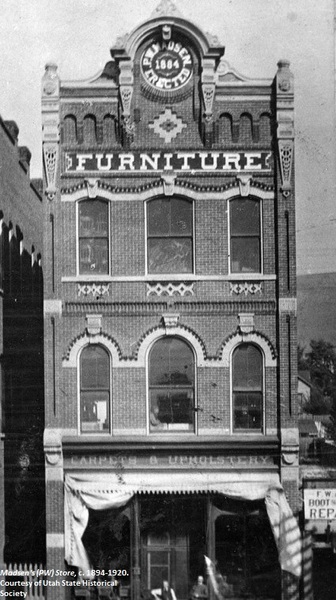Dublin Core
Title
Description
Long work hours and blurry lines between personal and professional lives is hardly a modern dilemma. But imagine if your employer controlled not just your hours and your paycheck, but where you spent your off hours and how you spent your money. Employees of the P.W. Madsen Furniture Store knew just how that felt.
The communal work ethic that helped early Mormons thrive in Salt Lake Valley relied heavily on the theocratic rule of the LDS Church. And while this rule was hardly absolute, its influence could be felt all the way down to the workplace. It was not uncommon, for example, for companies to adopt employee codes of conduct like that of the P.W. Madsen Furniture Company, which opened its doors in the late 1870s in downtown Salt Lake City.
Madsen’s employee code began by outlining business hours and expectations for keeping the premises clean. Workers were required to bring their own water and coal to keep warm, but had the freedom to whittle their writing quills to suit “individual taste.”
The code then outlined “duties of employees” that ventured deeply into their personal lives. “Any employee,” the code read, “who smokes Spanish cigars, uses liquor in any form, gets shaved at the barber shop, or frequents pool halls or public dance halls will give his employer every reason to suspicion his integrity, worthy intentions and all-around honesty.” In addition, Madsen expected his workers to donate ten percent of their annual income to the Church, dictating that $25 was the minimum donation. Employees were required to attend all Church functions, and those who “[went] regularly to Church and attend[ed] to Church duties” were rewarded with an extra night off for “courting purposes.” In conclusion, the code admonished that, “After any employee has spent his 13 hours of labor in the store, he should then spend his leisure time in the reading of good books, and the contemplating of the Glories – and building up – of the Kingdom of God.”
Madsen’s code may seem extreme, but it shows how theocracy supported community in early Utah. As the state became more diverse, such codes likely became difficult to enforce and then obsolete. Nonetheless, promoting community often came at the expense of liberty, even in the workplace.
Creator
Source
Image: Madsen's (PW) Store, c. 1894-1920. Historic address: 51-57 East 100 South, Salt Lake City. Courtesy of Utah State Historical Society.
_______________
See Leonard J. Arrington, Great Basin Kingdom: An Economic History of the Latter-Day Saints, 1830-1900, Urbana: University of Illinois Press, 2005; P.W. Madsen, “Our Business Code”; “The line between people’s work and nonwork lives continues to blur,” American Psychological Association, November 2015, Vol 46, No. 10.

